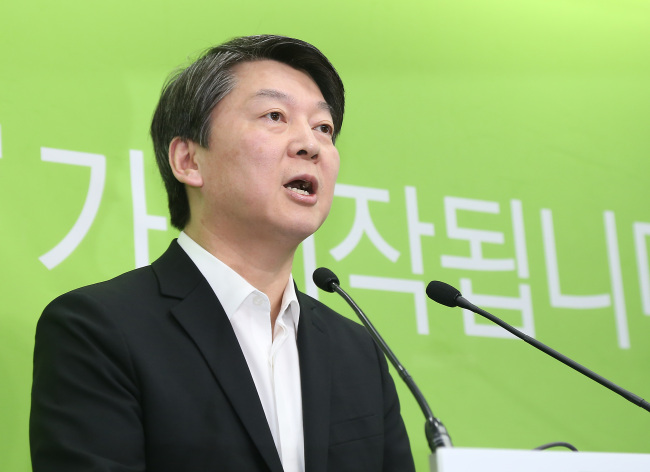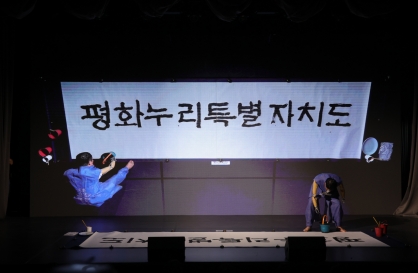[Newsmaker] Opposition chiefs at odds over election blueprints
By Korea HeraldPublished : March 6, 2016 - 17:58
The ongoing dispute on opposition unity has shown that the two opposition party leaders -- Kim Chong-in of The Minjoo Party of Korea and Rep. Ahn Cheol-soo of the People’s Party -- have distinctly different election strategies.
Kim, a 75-year-old veteran politician who was scouted as relief pitcher for the feud-ridden party, has made it clear that he is ready to accept anything if only to achieve a significant number of parliamentary seats in the imminent April general elections.
Ahn, on the other hand, has quite a few balls to juggle. Besides struggling to draw a line with the mainstream opposition camp and demonstrating his newborn party’s independent foothold ahead of April, he also has to map his way to the 2017 presidential race.
It is for such reasons that Ahn sternly turned down the idea of opposition unity, even at the risk of losing against the ruling conservative Saenuri Party.
Kim, a 75-year-old veteran politician who was scouted as relief pitcher for the feud-ridden party, has made it clear that he is ready to accept anything if only to achieve a significant number of parliamentary seats in the imminent April general elections.
Ahn, on the other hand, has quite a few balls to juggle. Besides struggling to draw a line with the mainstream opposition camp and demonstrating his newborn party’s independent foothold ahead of April, he also has to map his way to the 2017 presidential race.
It is for such reasons that Ahn sternly turned down the idea of opposition unity, even at the risk of losing against the ruling conservative Saenuri Party.

“Though the People’s Party is wandering in the wilderness, surrounded by enemies, there will be no turning back,” Ahn said Sunday in a press conference.
“We realize that this could mean death for all, but so be it.”
He thereby reiterated his flat refusal to Kim’s recent suggestion to “form an opposition unity for the sake of election victory,” despite the party’s plummeting ratings. Surveys have indicated that the new party’s approval ratings, which had once neared the 20 percent mark, fell to the 5-6 percent range in late February to early March.
Ahn is well aware that returning back to the mainstream opposition group would amount to giving up on his presidential roadmap.

“A party is bound to split apart when there are more than two within the party aspiring for presidency,” Kim said Saturday during a talk concert at Chonbuk University, referring to Ahn who may later compete with The Minjoo’s presidential runner Moon Jae-in.
In defense of his uncompromising rejection to unity, Ahn underlined that he had made three landmark concessions for the opposition over the past years, but these had been in vain.
The former information technology guru attracted the public’s attention when he renounced his potential candidacy back in the 2011 Seoul mayoral by-election, giving way to then-civic activist Park Won-soon.
He also united camps with opposition candidate Moon in the 2012 presidential race and later joined the then-Democratic Party in 2013, accepting the party’s repeated call for opposition unity.
“Mayor Park has made my concession worthwhile by winning the election as well as the people’s trust, but (The Minjoo Party) has fallen short of every promise that it has made,” Ahn said.
The Minjoo chief, who is largely aloof about his own political career development, has decided to pay undivided attention to the April race.
“I have no ambitions for a parliamentary seat or any other position,” Kim said.
“There are wild speculations on my political plots, but I am a 75-year-old man who was called back into the political circles.”
Kim, who formerly served as chief economic strategist for President Park, joined the opposition camp earlier this year as election strategy chief, allowing chairman Moon to step down from party affairs.
Once in power, he pushed ahead with a series of drastic plans to ready the party for the parliamentary elections. This included eyebrow-raising moves such as demanding for the termination of the high-profile filibuster and suggesting an opposition unity with party defectors.
Under all circumstances, the top priority task for the opposition is to judge the maladministration of the Park Geun-hye government by achieving victory on April 13, according to Kim.
Despite his apparent indifference to power, observers continue to speculate that the interim leader may further consolidate his power and possibly challenge the party’s proportional representative seat.
By Bae Hyun-jung (tellme@heraldcorp.com)
-
Articles by Korea Herald








![[Graphic News] Number of coffee franchises in S. Korea rises 13%](http://res.heraldm.com/phpwas/restmb_idxmake.php?idx=644&simg=/content/image/2024/05/02/20240502050817_0.gif&u=)










